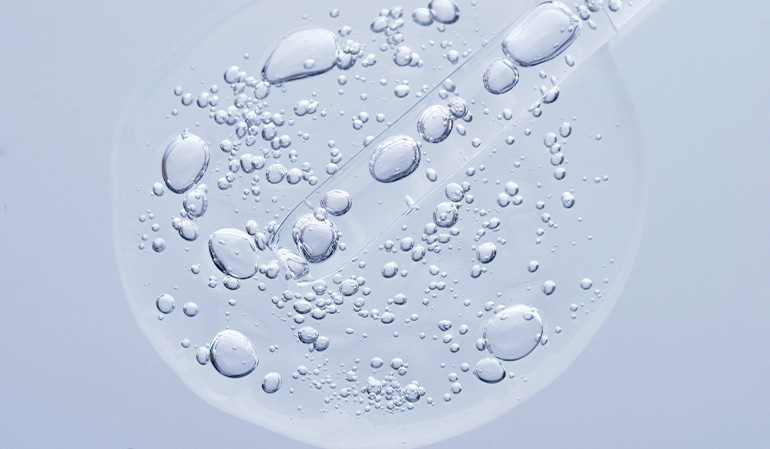Understanding the effects of hyaluronic acid on your body is essential for making informed decisions about your skincare routine and overall health.
Let’s explore the relationship between hyaluronic acid and weight gain to help you navigate this skincare aspect more confidently.
Quick Summary
No, hyaluronic acid is not known to cause weight gain. It’s primarily used for skin hydration and joint health, not affecting body weight.
Hyaluronic Acid Overview
What Is It
Hyaluronic acid, also known as hyaluronate or hyaluronan, is a substance naturally found in the human body. It acts as a lubricant and cushion in joints and tissues. This essential molecule is commonly used in skincare products for its hydrating properties.
rces of hyaluronic acid include animal connective tissues, such as rooster combs, and can also be produced synthetically for various applications. In industries like cosmetics and pharmaceuticals, hyaluronic acid plays a crucial role due to its moisture-retaining abilities.
Presence in Body
The body produces hyaluronic acid to maintain hydration levels in the skin, eyes, and connective tissues. It promotes cell renewal and wound healing while lubricating joints for smooth movement. Overall, hyaluronic acid supports healthy skin, joint function, and eye health.
Hyaluronic acid injections are commonly used to treat joint conditions like osteoarthritis. While these injections can provide relief by reducing pain and improving joint mobility, it’s essential to consider potential risks and benefits before opting for this treatment option.
Water Retention and Weight
Molecular Structure
Hyaluronic acid boasts a unique molecular structure, consisting of alternating units of N-acetylglucosamine and glucuronic acid.
This structure contributes to its exceptional water-retention properties, holding up to 1000 times its weight in water. The large molecular weight of hyaluronic acid allows it to retain moisture effectively, making it a popular ingredient in skincare products.
In skincare, the molecular weight of hyaluronic acid plays a crucial role. Low molecular weight variants penetrate deeper into the skin, offering hydration at a cellular level. On the other hand, high molecular weight hyaluronic acid forms a protective layer on the skin’s surface, preventing moisture loss.
Real-World Examples
Skin Care
-
Hyaluronic acid is widely used in skincare for its ability to hydrate and plump the skin.
-
It benefits various skin types, including dry, oily, and sensitive skin.
-
Combining hyaluronic acid with ingredients like vitamin C can enhance its effectiveness.
Joint Health
Consult Healthcare Provider
Before incorporating hyaluronic acid into your routine or using it as a supplement, consulting a healthcare provider is essential. They can assess your medical history and determine any potential risks associated with its usage. Proper dosage and administration guidance from a healthcare professional ensure safe and effective utilization.
Safety and Reactions
Rare Reactions
Possible rare allergic reactions to hyaluronic acid can include redness, swelling, or itching at the injection site. These reactions are uncommon but require immediate attention. Symptoms of adverse effects should not be ignored, and consulting a healthcare provider is crucial for proper treatment.
Seeking immediate medical attention is essential if severe reactions occur, such as difficulty breathing or chest tightness. Prompt intervention can prevent further complications and ensure a safe recovery from any adverse effects of hyaluronic acid.
Pregnancy and Nursing
When it comes to pregnancy and nursing, safety considerations regarding hyaluronic acid are paramount. Limited research exists on the effects of hyaluronic acid during pregnancy. Healthcare professionals recommend avoiding its use during this critical period due to potential risks for both the mother and baby.
Healthcare providers advise against using hyaluronic acid while nursing as well. The lack of data on its impact on breastfeeding infants makes it a cautious choice for mothers seeking skincare treatments during this sensitive time.
Interactions
Hyaluronic acid may interact with certain medications or supplements, affecting their absorption or efficacy. Informing healthcare providers about its use is crucial to avoid any potential complications or reduced effectiveness of other substances being taken concurrently.
It’s important to discuss with a healthcare professional before combining hyaluronic acid with any medications or supplements to ensure there are no adverse interactions that could impact overall health outcomes.
Different Forms Usage
Oral Supplements
Hyaluronic acid supplements offer hydration benefits for joints and skin, aiding in joint health and skin elasticity. The recommended dosage for oral intake varies based on individual needs. It’s crucial to consult a healthcare provider before starting any supplement regimen. Overconsumption may lead to gastrointestinal issues like upset stomach.
Topical Products
Topical skincare products with hyaluronic acid are effective in retaining moisture, promoting plump and hydrated skin. They help reduce the appearance of fine lines and wrinkles, enhancing overall skin texture. When selecting a product, consider factors such as skin type and specific concerns like dryness or aging.
Eye Drops
Hyaluronic acid eye drops provide relief for dry eyes by lubricating the surface of the eye. They offer a safe and soothing solution for individuals experiencing discomfort due to dryness or environmental factors. Proper usage involves applying the drops as directed by an eye care professional to avoid any adverse reactions.
Intimate Use
For intimate areas, hyaluronic acid products can address vaginal dryness and discomfort, promoting natural lubrication. These products are designed to be gentle and hydrating, enhancing comfort without irritation. Users should prioritize products specifically formulated for intimate use to ensure safety and efficacy.
How It Works
Transporting Molecules
Hyaluronic acid plays a crucial role in transporting molecules within the body, aiding in various physiological functions. It enhances the delivery of essential nutrients or medications to targeted areas efficiently. This attribute makes it invaluable in applications such as drug delivery systems, ensuring precise and effective distribution.
Scaffold for Tissue
Functioning as a scaffold for tissue engineering, hyaluronic acid provides vital support for tissue regeneration and repair processes. By creating a conducive environment for cell growth and activity, it promotes the development of new tissues.
Recent innovations have explored advanced techniques utilizing hyaluronic acid as a versatile material for tissue scaffolding, revolutionizing regenerative medicine practices.
Effectiveness in Body
Skin Health
Hyaluronic acid plays a crucial role in maintaining optimal skin health by retaining moisture within the skin cells. This leads to plump, hydrated skin that appears more youthful and radiant. The biological effects of hyaluronic acid include improved skin elasticity and reduced appearance of fine lines and wrinkles.
Addressing common skin issues, hyaluronic acid can alleviate dryness, redness, and irritation on the skin’s surface. By deeply hydrating the skin, it creates a protective barrier against environmental aggressors, promoting a healthy complexion. Incorporating hyaluronic acid into daily skincare routines is simple through serums, moisturizers, or masks for maximum benefits.
Acne Treatment
In acne treatment, hyaluronic acid aids in balancing oil production and preventing excess sebum buildup that can clog pores. Its lightweight texture makes it suitable for acne-prone skin, providing hydration without clogging pores or exacerbating breakouts. Hyaluronic acid’s soothing properties also help reduce inflammation associated with acne.
The benefits of combining hyaluronic acid with other acne-fighting ingredients like salicylic acid or niacinamide include a comprehensive approach to treating acne. While hyaluronic acid hydrates the skin, these ingredients target specific acne-causing factors such as bacteria and excess oil production.
Consulting Healthcare Provider
Skin Concerns
Hyaluronic acid is beneficial for specific skin issues like eczema or psoriasis. Consulting dermatologists ensures personalized skincare advice tailored to individual needs. Dermatologists can recommend suitable hyaluronic acid products for optimal results.
Addressing skin concerns with hyaluronic acid involves understanding its hydrating properties. The ingredient helps retain moisture, improving skin texture and overall hydration levels. For conditions like eczema, hyaluronic acid can soothe dryness and reduce irritation effectively.
Eye Concerns
When it comes to eye-related concerns, hyaluronic acid offers benefits for under-eye circles and puffiness. Choosing eye products containing hyaluronic acid can aid in reducing the appearance of fine lines and wrinkles. These products help hydrate the delicate skin around the eyes, promoting a more youthful appearance.
Incorporating hyaluronic acid into skincare routines can enhance skin health and address various concerns effectively. Dermatologists play a crucial role in providing personalized recommendations based on individual skin types and conditions. Seeking professional consultancy ensures making informed decisions for optimal skincare outcomes.
Closing Thoughts
In the quest for better health, understanding how hyaluronic acid affects your body is crucial. From its role in hydration to potential weight impacts, being informed empowers you to make the best choices. Remember, consulting your healthcare provider before any new supplement regimen is always wise.
s you navigate the world of hyaluronic acid and its effects on your body, stay curious and proactive. Your well-being is a journey that deserves attention and care. Keep learning, keep questioning, and keep prioritizing your health above all else.
Frequently Asked Questions
Does hyaluronic acid cause weight gain?
Hyaluronic acid does not cause weight gain. It primarily retains moisture in the skin and joints, promoting hydration and elasticity.
Is hyaluronic acid safe to use?
Hyaluronic acid is generally safe for most people when used as directed. However, consult with a healthcare provider before starting any new supplement regimen.
How does hyaluronic acid work in the body?
Hyaluronic acid functions as a lubricant and cushion in joints and tissues, aiding in moisture retention for supple skin and joint flexibility.
What are the different forms of hyaluronic acid usage?
Hyaluronic acid is available in various forms such as oral supplements, topical creams, and injections for specific targeted benefits.
Should I consult a healthcare provider before using hyaluronic acid?
It is advisable to consult a healthcare provider before using hyaluronic acid, especially if you have existing medical conditions or are pregnant or breastfeeding.

